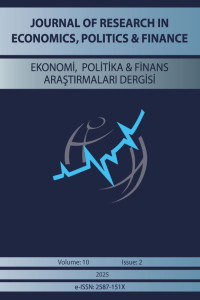Öz
Bu çalışma, 2011-2022 yılları arasındaki dönemde ülkenin en büyük 20 ticaret ortağına ait veriyi analiz ederek Türkiye için bir turizm talep fonksiyonu geliştirmektedir. Statik panel veri yöntemleri kullanılarak, toplam dış ticaret, ihracat ve ithalatı çeşitli kontrol değişkenleriyle birlikte bağımlı değişken olarak içeren üç farklı model oluşturulmuştur. Sonuçlar, Türkiye'ye yönelik turizm talebinin birincil belirleyicisinin turist gönderen ülkelerin gelir seviyesi olduğunu, bunu nüfus büyüklüğünün takip ettiğini göstermektedir. Dış ticaretin turizm talebi üzerindeki etkisinin, göreli fiyattan daha belirgin olduğu tespit edilmiştir. Çalışma, ithalat ve ihracatın turizm talebi üzerindeki etkisinin asimetrik olduğunu ortaya koymakta ve ihracatın ithalattan daha büyük bir etkiye sahip olduğunu göstermektedir. Bu bulgular, politika yapıcıların ihracatı teşvik eden hükümet sübvansiyonlarına odaklanması gerektiğini, çünkü bu tür politikaların yalnızca ihracat kapasitesini artırmakla kalmayıp aynı zamanda turizm talebini de teşvik ettiğini göstermektedir. Turizmin gelişmekte olan ekonomiler için döviz kazandırma konusundaki kritik rolü göz önüne alındığında, ihracat kapasitesinin artırılması hem döviz rezervlerini güçlendirme hem de turizm sektörünü destekleme açısından çift yönlü fayda sunmaktadır. Bu araştırma, ticaret ve turizm arasındaki karmaşık etkileşimi daha iyi anlamaya katkıda bulunmakta ve Türkiye ile benzer gelişmekte olan ülkeler için iktisadi politika oluşturma konusunda derinlemesine bilgi sağlamaktadır.
Anahtar Kelimeler
Turizm ve Dış Ticaret Turizm Talep Fonksiyonu Panel Veri Analizi Sabit Etkiler Modeli
Kaynakça
- .............................................
Öz
This study empirically examines the relationship between inbound tourism demand and foreign trade for Türkiye by employing panel data analysis to estimate tourism demand function that incorporates an export variable alongside conventional determinants. The results reveal that a 10% increase in exports corresponds to a 2.11% rise in tourist arrivals. This positive linkage is attributed to strengthened interpersonal networks, enhanced transportation infrastructure and greater destination visibility fostered by trade relations. However, this link does not follow a linear pathway. While exports robustly impact tourism under normal conditions, the influence vanishes during crises with mobility restrictions. COVID-19 restrictions caused a structural break for tourism-trade nexus of Türkiye. The insignificant export-pandemic interaction term employed in the econometric model proves that trade loses its stimulating effect to tourism during international mobility crises. Key findings also highlight that GDP and population size of source countries are the primary determinants of Türkiye’s tourism demand and exports exert a larger effect than relative prices. Results suggest that policymakers should adopt alternative strategies independent from international mobility conditions to sustain the tourism sector in such shocks and export promotion may be more effective than price competitiveness strategies in stimulating demand.
Anahtar Kelimeler
Tourism-Trade Nexus Exports and Tourism Demand Tourism Demand Function Panel Data Analysis
Etik Beyan
A study conducted for the Central Bank of the Republic of Türkiye titled “The Effects of Foreign Trade on Foreign Exchange Earnings: The Case of Tourism Sector” provided the empirical basis for this research. Original study have been intensively refined and elaborated with this manuscript.
Destekleyen Kurum
Central Bank of the Republic of Türkiye
Kaynakça
- .............................................
Ayrıntılar
| Birincil Dil | İngilizce |
|---|---|
| Konular | Ekonometrik ve İstatistiksel Yöntemler, Panel Veri Analizi , Turizm Ekonomisi, Uluslararası Ticaret (Diğer) |
| Bölüm | Makaleler |
| Yazarlar | |
| Yayımlanma Tarihi | 30 Haziran 2025 |
| Gönderilme Tarihi | 24 Şubat 2025 |
| Kabul Tarihi | 7 Mayıs 2025 |
| Yayımlandığı Sayı | Yıl 2025 Cilt: 10 Sayı: 2 |


